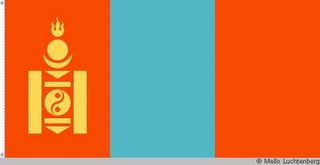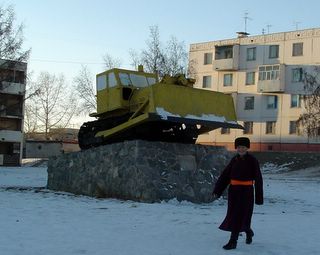Given what I've read around the web, there's a sneaking opinion in many quarters that Mongolia is a country that is breathlessly waiting to revert to closed markets, accordion wire, and good old-fashioned communism. There’s an equally strong view that Mongolia is ripe for democratic revolution, the next domino to fall in the wave of freedom that is sweeping the Middle East and the former Eastern Bloc. Well, let me set the record straight on both accounts. I thought I'd take a few minutes and demonstrate, using as objective information as I can find, just how free, open, and stable this former Eastern Bloc country has been, is now, and, if past trends are any indication for future events, will yet be.
Using the information posted on Freedom House’s excellent website, I put together a rough and ready (and admittedly unscientific) comparison of Mongolia and the former East Bloc countries, many of whom, like Mongolia, were vassal states to the USSR. I also threw in a few Asian countries to provide regional comparison.
Legend:
Example: Country_A X / Y
where:
X = political rights
Y = civil liberties
Both X and Y are scored using numbers between 1 and 7, with 1 representing the highest level of freedom, and 7, the lowest level.
Let’s start with the 1994 stats. (This was the earliest year for which Freedom House provides such statistics online). These numbers give us a pretty good idea of where things stood following the democratization that deluged the region once the Soviet dam broke.
| Sorted by 1994 scores |
|
| Rank | Country | 1994 |
| 1 | Czech Republic | 1/2 |
|
| Hungary | 1/2 |
|
| Slovenia | 1/2 |
| 4 | Lithuania | 1/3 |
| 5 | Bulgaria | 2/2 |
|
| Poland | 2/2 |
| 7 | Mongolia | 2/3 |
|
| Slovakia | 2/3 |
| 9 | Estonia | 3/2 |
|
| Latvia | 3/2 |
| 11 | Albania | 3/4 |
|
| Armenia | 3/4 |
|
| Russia | 3/4 |
|
| Ukraine | 3/4 |
| 15 | Kygyz Republic | 4/3 |
|
| Macedonia | 4/3 |
|
| Romania | 4/3 |
| 18 | Belarus | 4/4 |
|
| Croatia | 4/4 |
|
| Moldova | 4/4 |
| 21 | Georgia | 5/5 |
| 22 | Kazakhstan | 6/5 |
| 23 | Azerbaijan | 6/6 |
|
| Bosnia-Herzegovina | 6/6 |
|
| Serbia and Montenegro | 6/6 |
| 26 | Tajikstan | 7/7 |
|
| Turkmenistan | 7/7 |
|
| Uzbekistan | 7/7 |
|
|
|
|
|
| Japan | 2/2 |
|
| S. Korea | 2/2 |
|
| Taiwan | 3/3 |
|
| India | 4/4 |
|
| China | 7/7 |
|
| N. Korea | 7/7 |
Among other things, notice just how fast out of the gate Mongolia was in establishing its freedoms and democratizing its political process.1994 was about 4 years after Mongolia made the jarring transfer from autocracy/communism to democracy. Already, Mongolia had earned a highly respected 2/3 rating (from something I would guess to be in the 6/6 to 7/7 range).
In terms of rank, Mongolia had a strong showing at number 7—well ahead of the next Central Asian republic (Armenia) and also ahead of such traditionally western countries as Estonia and Latvia. Comparison with Mongolia’s geographical neighbors is even sharper: Russia, Mongolia’s neighbor to the north still hung at 3/4, Kazakhstan, immediately to the west, lingered at a dismal 6/5, while the Kyrgyz Republic, further to the west, came in at 4/3. China, just to the south, checked in with an atrocious 7/7.
There’s a lot more to be said, but I think it’s clear that Mongolia moved quickly and decisively in the direction of democracy. Even Romania could have learned (and, to anticipate myself a bit, still can) a lot from the Mongolians.
Let’s move on to see how things stand today, or at least as they stood in 2003, the last year for which I can find numbers:
| Sorted by 2003 scores |
|
| Rank | Country | 2003 |
| 1 | Slovenia | 1/1 |
| 2 | Bulgaria | 1/2 |
| Czech Republic | 1/2
|
|
| Estonia | 1/2 |
|
| Hungary | 1/2 |
|
| Latvia | 1/2 |
|
| Lithuania | 1/2 |
|
| Poland | 1/2 |
|
| Slovakia | 1/2 |
| 10 | Croatia | 2/2 |
|
| Mongolia | 2/2 |
|
| Romania | 2/2 |
| 13 | Serbia and Montenegro | 3/2 |
| 14 | Albania | 3/3 |
|
| Macedonia | 3/3 |
| 16 | Moldova | 3/4 |
| 17 | Armenia | 4/4 |
|
| Bosnia-Herzegovina: | 4/4 |
|
| Georgia | 4/4 |
|
| Ukraine | 4/4 |
| 21 | Russia | 5/5 |
| 22 | Azerbaijan | 6/5 |
|
| Kazakhstan | 6/5 |
|
| Kygyz Republic | 6/5 |
|
| Tajikstan | 6/5 |
| 26 | Belarus | 6/6 |
| 27 | Uzbekistan | 7/6 |
| 28 | Turkmenistan | 7/7 |
|
|
|
|
|
| Japan | 1/2 |
|
| S. Korea | 2/2 |
|
| Taiwan | 2/2 |
|
| India | 2/3 |
|
| China | 7/6 |
|
| N. Korea | 7/7 |
Despite moving down in the rankings over these ten years (from tied for 7th to tied for 10th) Mongolia’s score has improved (from 2/3 to 2/2). This demonstrates a number of things, principle among them Mongolia’s stability. With numbers like this, it's easy to understand why Mongolia has been able to have nine national parliamentary and presidential national elections in about 15 years--all of them free, fair, and, perhaps most tellingly, friendly (compare elsewhere in the region). That political power has changed been passed back and forth between several parties is an indication that the Republic is advancing more strongly, more peacefully, and more openly than ever.
It is also instructive to notice that the four countries that surpassed Mongolia in the ranking were all western (Latvia, Estonia, Croatia, Slovakia), and had, until Soviet expansion, had been philosophically and politically liberal, whereas Mongolia—it should go without saying—had not been. Rather, it had been under Chinese Nationalist and then, from 1921, Communist Russian domination. To say that Mongolia had enjoyed little to no open contact with liberal political ideas until the Iron Curtain unraveled would be too obvious by half. Nevertheless, Mongolia took hold of the idea of a liberal democracy and has been running ever since and ever faster.
Again, in comparison with many of its ethnic, cultural, or geographical cohorts, Mongolia’s standing in the survey form the period of 1994 to 2003 has proved exceptionally stable. A number of countries saw freedoms either advance and then retreat or retreat and then advance. Take several examples of the latter phenomenon. The Kyrgyz Republic had a score of 4/3 in 1994 (3rd best among Central Asian countries) but dropped to 6/5 by 2003 (and 4th from the bottom in CA). Belarus, then 4/4, has sunk to 6/6 under the heavy heel of Russia, which itself has dropped from 3/4 to 5/5. Kazakhstan, it must be said, has maintained stability, but stability of a rather wretched variety—6/5 then, 6/5 now. Indeed, Mongolia is an island of democratic freedom in a deeply troubled region (see a color coded map here [opens as a PDF]). (This article does not take into account the recent democratic struggles pursued by a number of CA nations).
Much more could be said, such as the parity Mongolia shares with such Asian nations as Taiwan (2/2) and South Korea (2/2) in terms of political rights and civil liberty, but I think that the numbers speak more clearly than I ever could. Regardless, by this much, it should be clear that Mongolia has been democratic since the very beginning of it’s new national existence, is democratic, and will remain democratic as long as it depends on the Mongolians. Indeed, my guess is that in the next year or two, Mongolia will make even greater strides in democracy and, in doing so, will continue to be a model for the fledgling democracies in the region and beyond.
Update: I have just discovered more complete data which covers the years 1972 through 2005 (click here). Mongolia has remained at a 2/2 (having risen, as I suspected, from a 7/7 in 1989). This newly-found data does not significantly impact the conclusions I drew in this article.
Update: Fixed mistake in rankings and a typo or two.
Read more...







